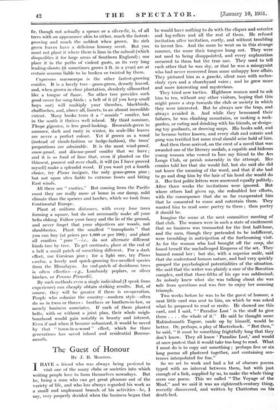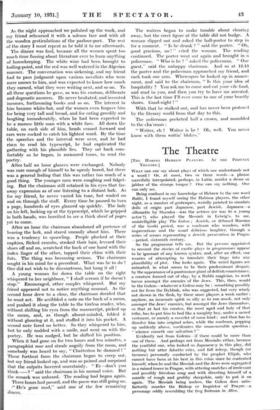The Guest of Honour
BY J. B. MORTON.
IHAVE a friend who was always being pestered to visit one of the many clubs or societies into which writing people love to form themselves nowadays. But he, being a man who can get great pleasure out of the variety of life, and who has always regarded his work as a small and unpleasant branch of his activities—be, I say, very properly decided when the business began that he would have nothing to do with the cliques and coteries and log-rollers and all the rest of them. He refused invitation after invitation, curtly, and without troubling to invent lies. And the more he went on in this strange manner, the more their tongues hung out. They were not used to being disappointed, and every explanation occurred to them but the true one. They used to tell each other that he was shy, or that he was a misogynist who had never recovered from some unhappy love affair. They pictured him as a gauche, silent man with melan- choly eyes and a churchyard voice ; and he grew more- and more interesting and mysterious.
They tried new tactics. Highbrow women used to ask him to tea, without any other visitors, hoping that this might prove a step towards the club or society in which they were interested. But he always saw the trap, and always avoided it. And while they bemoaned their failures, he was climbing mountains, or making a rock- garden, or eating and drinking with his friends, or design- ing toy gunboats, or drawing maps. His books sold, and he became better known, and every club and coterie and • gang was terrified lest some rival should seize hold of him. And then there arrived, on the crest of a novel that was awarded one of the literary medals, a capable and hideous young woman who vowed to lure my friend to the Ars Longa Club, or perish miserably in the attempt. Her- cronies told her that she would fail, but she said she did not know the meaning of the word, and that if she had to go and drag him by the hair of his head she would do• it. Her first polite letters were answered equally politely: After three weeks the invitations were ignored. But- where others had given up, she redoubled her efforts, with the consequence that she so far exasperated him that he consented to come and entertain them. They wanted him to read some poetry to them ; then poetry it should be.
Imagine the scene at the next committee meeting of that club. The women were in such a state of excitement that no business was transacted for the first half-hour, and the men, though they pretended to be indifferent, were trembling in anticipation of the forthcoming visit.
As for the woman who had brought off the coup, she found herself the unchallenged Empress of the set. They buzzed round her ; but she, with a superior smile, said that she understood human nature, and had very quickly grasped the psychological potentialities Of the situation. She said that the writer was plainly a case of the Boeotian complex, and that three-fifths of his ego was subliminal: As nobody knew what she was talking about she was safe from questions and was free to enjoy her amazing triumph. . .
Two weeks before he was to be the guest of-honour, a. neat little card was sent to him, on which he was asked what he proposed to read or recite. He showed me this- card, and I said, " ' Paradise Lost ' is the stuff to give them . . . . the whole of it." He said he thought some Rabindranath Tagore, made up by himself, would be better. Or, perhaps, a play of Maeterlinck. " But then," he said, " it must be something frightfully long that they don't know. They all know ' Paradise Lost,' and would at once protest that it would take too long to read. What I must do is to copy out something ; perhaps five or six long poems all plastered together, and containing sen- tences interpolated for fun."
So we set to work and had a lot of obscure poems typed with no interval between them, but -with jusb enough of a link, supplied by us, to make the whole thing seem one poem. -This we called " The Voyage -of the Mind," and we said it was an eighteenth-century thing, recently .discovered, and written by Chatterton on -his &ath-bed. As the night approached we polished up the work, and my friend rehearsed it with a solemn face and with all the wooden gesticulations of the parlour-poet. The rest of the story I must repeat as he told it to me afterwards.
The dinner was foul, because all the women spent too much time fussing about literature ever to learn anything of housekeeping. The white wine had been brought to boiling-point, and the red was well watered in the Algerian manner. The conversation was sickening, and my friend had to pass judgment upon various novelists who were mere names to him, and was expected to know how much they earned, what they were writing next, and-so on. To all these questions he gave, as was his custom; deliberate and dogmatic answers. He never hesitated, and invented incomes, forthcoming books and so on. The interest in him became white-hot, and the women even forgave him for .being very tall and broad, and for eating greedily and laughing immoderately, when he had been expected to be a morose little man With a white face. All down the table, on each side of him, heads craned forward and ears were cocked to catch his lightest word. By the time the speeches and the interval were over, and he had risen to read his typescript, he had captivated the gathering with his plauSible lies. They sat back com- fortably as he began, in measured tones, to read the poetry.
After half an hour glances were exchanged. Nobody was sure enough of himself to be openly bored, but there was a general feeling that this was rather too much of a good thing. The younger men were coughing and fidget- ing. But the chairman still retained in his eyes that far- away expression as of one listening to a distant lark. As for my friend, he never varied his tone, but waded on and on through the stuff. Every time he paused to turn a page, hundreds of eyes glanced up quickly. The lady on his left, looking up at the typescript, which he gripped in both hands, was horrified to see a thick sheaf of pages yet to come.
After- an hour the chairman abandoned all pretence of hearing the lark, and stared uneasily about him. There was A tendency to sprawling. People plucked at their napkins, flicked crumbs, stroked their hair; levered their shoes Off and on, scratched the back of one hand with the index finger of the other, tapped their chins with their fists. The thing was becoming serious. The chairman Sought in his mind for a precedent. What was he to do ? One did not wish to be discourteous, but hang it all !
A young woman far down the table on the right whispered to her neighbour, " I shall scream if he doesn't stop:" Encouraged, other couples whispered. But my friend appeared not to notice anything unusual. As the second hour drew to a close, the chairman decided that he must act. He scribbled a note on the back of a menu, and pushed it along the table to the tireless reader, who, without shifting his eyes from the manuscript, picked up the menu, and, as though absent-minded, folded it without glancing at it, and stuffed it into his pocket. A second note fared no better. So they whispered to him, but he only nodded with a smile, and went on with the poetry. He was nudged, but he shifted his position.
When it had gone on for two hours and ten minutes, a paragraphist rose and strode angrily from the room, and somebody was heard to say, " Chatterton be damned ! " Those furthest from the chairman began to creep out, but my friend looked up, and was so pained and surprised that the culprits hovered uncertainly. " Er—don't you " said the chairman in his normal voice. But the remark. was unheard. The reading had begun again. Three hours had passed, and the poem was still going on. -”-He's gone mad," .said one of the few remaining diners. The waiters began to make trouble about clearing away, but the erect figure at the table did not budge. A woman slipped out and asked the hall-porter to step in for a moment. " Is he drunk ? " said the porter. " Oh, good gracious, no ! " cried the woman. The reading continued. The porter went out again and brought in a policeman. " Who is he ? " asked the policeman. " Our guest," said the unhappy chairman. And so at 12.15 the porter and the policeman approached my friend, and each took one arm. Whereupon he looked up in amaze- ment, and said to the chairman, " Is this your idea of hospitality ? You ask me to come and eat your vile food, and read to you, and then you try to have me arrested. This is the last time I'll ever come to one of your beastly shows. Good-night ! "
With that he stalked out, and has never been pestered by the literary world from that day to this.
The policeman pocketed half a crown, and mumbled to the chairman : " Writer, eh ? Writer is he ? Oh, well. You never know with them writin' blokes."



































 Previous page
Previous page